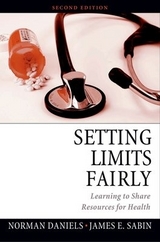
Setting Limits Fairly
Can we learn to share medical resources?
Seiten
2002
Oxford University Press Inc (Verlag)
978-0-19-514936-4 (ISBN)
Oxford University Press Inc (Verlag)
978-0-19-514936-4 (ISBN)
Zu diesem Artikel existiert eine Nachauflage
The central discussion of this text is that we lack consensus on the principles for allocating resources; in the absence of such a consensus we must rely on a fair decision-making process for setting limits on health care. The authors provide an analysis of the current situation and then go on to describe their own approach.
The central idea for this book is that we lack consensus on principles for allocating resources and in the absence of such a consensus we must rely on a fair decision-making process for setting limits on health care. The authors characterize key elements of this process in a variety of health care contexts where such decisions are made- decisions about insurance coverage for new technologies, pharmacy benefit management, the design of physician incentives, contracting for mental health care by public agencies, etc.- and they connect the problem in the U.S. with the same problem in other countries. They provide a cogent analysis of the current situation, lucidly review the usual candidate solutions, and describe their own approach, which represents a clear advance in thinking. Their intended audience is international since the problem of limits cuts across types of health care systems whether or not they have universal coverage.
The central idea for this book is that we lack consensus on principles for allocating resources and in the absence of such a consensus we must rely on a fair decision-making process for setting limits on health care. The authors characterize key elements of this process in a variety of health care contexts where such decisions are made- decisions about insurance coverage for new technologies, pharmacy benefit management, the design of physician incentives, contracting for mental health care by public agencies, etc.- and they connect the problem in the U.S. with the same problem in other countries. They provide a cogent analysis of the current situation, lucidly review the usual candidate solutions, and describe their own approach, which represents a clear advance in thinking. Their intended audience is international since the problem of limits cuts across types of health care systems whether or not they have universal coverage.
1. Our Lives in Whose Hands? ; 2. Justice, Scarcity, and Public Accountability for Limits ; 3. The Legitimacy Problem and Fair Process ; 4. Accountability for Reasonableness ; 5. Managing Last-Chance Therapies ; 6. Lung Volume Reduction Surgery: A Case Study ; 7. Making Pharmacy Benefits Accountable for Reasonableness ; 8. Indirect Limit Setting: Accountability for Physician Incentives ; 9. Accountability for Reasonableness in Action: Public Sector Contracting for Mental Health Care ; 10. An International Learning Curve ; 11. Learning to Share Medical Resources
| Erscheint lt. Verlag | 28.3.2002 |
|---|---|
| Verlagsort | New York |
| Sprache | englisch |
| Maße | 165 x 239 mm |
| Gewicht | 463 g |
| Themenwelt | Medizin / Pharmazie ► Gesundheitswesen |
| Medizin / Pharmazie ► Medizinische Fachgebiete ► Medizinethik | |
| Studium ► Querschnittsbereiche ► Geschichte / Ethik der Medizin | |
| Studium ► Querschnittsbereiche ► Prävention / Gesundheitsförderung | |
| Wirtschaft | |
| ISBN-10 | 0-19-514936-X / 019514936X |
| ISBN-13 | 978-0-19-514936-4 / 9780195149364 |
| Zustand | Neuware |
| Haben Sie eine Frage zum Produkt? |
Mehr entdecken
aus dem Bereich
aus dem Bereich
Die Geschichte eines Weltzentrums der Medizin von 1710 bis zur …
Buch | Softcover (2021)
Lehmanns Media (Verlag)
CHF 27,90
Krankheitslehren, Irrwege, Behandlungsformen
Buch | Softcover (2024)
C.H.Beck (Verlag)
CHF 55,90



